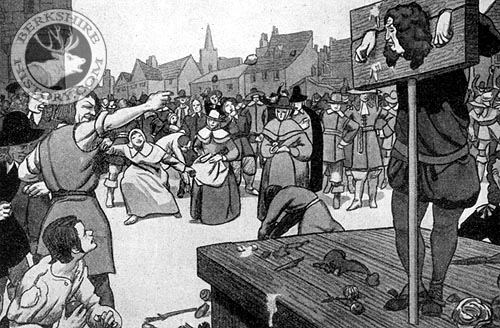 |
 |
|||
|
 A Star Chamber A Star ChamberPunishment in Reading Spreading Rumours about the Elite could be Dangerous In 1633 a strange spectacle was seen in Reading. On Saturday 21st December, being market day, the Mayor and Corporation assembled in the Market Place. With them were the constables and other officers: A great concourse of townspeople and country folk crowded around them. They had gathered there to see a man, Lodowick Bowyer by name, set in a pillory by order of the Court of Star Chamber. The pillory was a sort of wooden frame, in which a man was fixed in a standing posture so firmly that he could move neither his head nor his hands. Bowyer's ears were nailed to the pillory, and a paper was fastened upon his head describing the offence of which he had been guilty. He was required to read to the crowd a confession of his fault and, there, he was left in his shame, a target for all who might fling stones or filth upon him, until it was considered that his punishment had been enough. Then he was taken back to prison. What was the offence of which Lodowick Bowyer had been guilty? In the previous September, this man was in Reading. He seems to have been a talkative, bragging fellow and very likely he was too fond of tavern company. He was foolish enough to spread a malicious story about William Laud, who had just been made Archbishop of Canterbury. This story was to the effect that Laud had been writing letters to the Pope. These letters had been discovered and, because of them, the King, said Bowyer, had placed Laud under arrest. Bowyer also said that Laud had been sending large sums of money every year to the Pope. The people of England detested the Pope and these statements, if true, must have caused them to think ill of Laud. There was no truth in this silly story. Yet men's minds were excited about Laud just then, and many people suspected that he was a Roman Catholic at heart. In Reading, people were sure to listen to any gossip about him, for Laud was a Reading man. Bowyer's tale came to the ears of the Mayor of Reading, who inquired into it and threw Bowyer into prison. When the Mayor reported what Bowyer had said to the Secretary of State in London, the Secretary of State said that no man would tell such a foolish story who was not drunk or mad. The Mayor of Reading, however, made much ado about a small trouble, and nothing would please him but to send Bowyer to London. Soon afterwards Bowyer was brought before the Court of Star Chamber. When we read the punishment which was ordered to be inflicted upon this babbler, we can understand how the English people came to hate the Court of Star Chamber. The Court of Star Chamber said that Bowyer was to pay a fine of £3,000 (about £ ¼m today), that he was to stand in the pillory three times - twice in London and once in Reading - with his ears nailed to the pillory, that he was to be whipped, that he was to be branded in the face with the letter ‘R’ to signify ‘Rogue’ or ‘L’ to signify ‘Liar,’ and that, after these punishments had been inflicted upon him, he was to be imprisoned for life. Edited from W.M. Childs' "The Story of the Town of Reading" (1905)
|
|||
| © Nash Ford Publishing 2017. All Rights Reserved. | ||||





